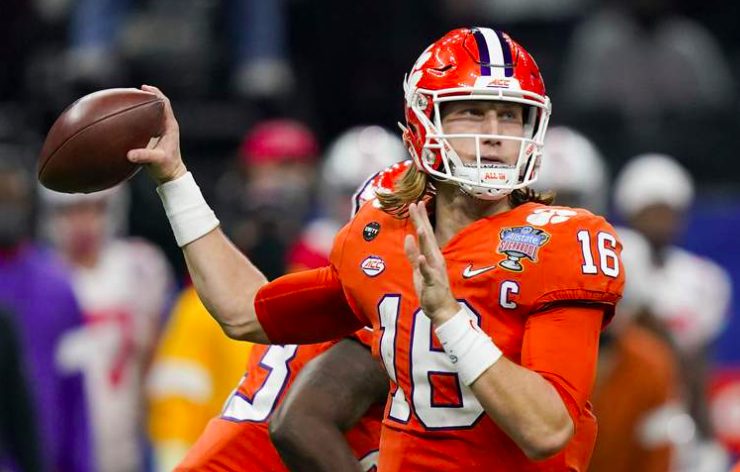Trevor Lawrence is getting motivation right
Nicholas Wykes • Apr 20, 2021
Trevor Lawrence is good at football. And he's psychologically healthy too.

It’s draft season, a time for analysis and in-depth interrogation of this year’s class of potential NFL freshmen. Trevor Lawrence is the presumptive number one overall pick, prospective ‘generational’ talent, and almost certainly the Jacksonville Jaguars new starting quarterback. The analysis is near universal, he’s got it all, he’s a can’t miss prospect, he’s essentially flawless. And then he said this about his football career:
And the public narrative suddenly became centred on Lawrence’s lack of competitive fire, perhaps a questionable work ethic, a lack of drive to succeed. And it has finally produced something his impeccable college career could not – doubt. And of course it’s nonsense.
No single phenomenon reflects the positive potential of human behaviour as much as motivation, it generates challenge, curiosity, persistence, focus, concentration and exploration. It is a natural inclination towards mastery. It flourishes in circumstances that are designed to maintain it and these conditions are the important first step in understanding how to nurture optimal performance conditions – make no mistake there is no guarantee but decades of research demonstrate that the positive aspects of human nature are promoted in conditions that are supportive of intrinsic motivation.
Both extrinsic and intrinsic motivation relate to performance variables and perceptions. Intrinsic motivation correlates positively to participation, satisfaction and competence. Extrinsic motivation correlates to anxiety and low self-esteem. What’s interesting is that the core components of facilitating intrinsic motivation are used to convert extrinsic motivation from external regulation to identified regulation on a continuum. No doubt Tom Brady began with a chip on his shoulder about being drafted 199th, and Aaron Rodgers was motivated by his surprising draft day slide, but both future hall of famers took that externally regulated motivation, introjected it and then regulated it. The hallmarks of intrinsically motivated competitors is one of the reasons they are great.
Extrinsic motivation refers to performance of an activity to attain some separable outcome and can vary greatly in its relative properties and merits. It is instrumental. Extrinsic motivation is externally regulated requiring compliance with outside agents and is coerced. Extrinsic evolution involves introjection where the external control has been internalised to the extent that gaining approval or avoiding disapproval motivates. Finally identified regulation allows the individual to become motivated through interest, ability and desire to achieve self-initiated goals.
There remains a difficulty in rationalising the perception of intrinsic motivation, it’s too personal, too vague to the outsider. Extrinsic motivation is visible, tangible, relatable – it’s getting picked late in the draft, it’s getting passed over, its feuding over status, it’s facing a former team, it’s bulletin board material. And it has some value even at the externally regulated level to the competitor. It’s just, fleeting, fragile, less healthy and ultimately less rewarding. That Trevor Lawrence has been pilloried in the press and public for describing his healthy, intrinsic motivation for excellence at his sport speaks to our need for provocation. Professional athletes go so far as to create their own narratives for extrinsic motivation – Michael Jordan was a prime mover in this respect, forever creating perceived slights at which to rage. However, knowing what we do about Jordan’s own performance ethic and media savvy, this would seem to be more of a piece of performance art designed to make it publicly digestible. Something Lawrence seems to have decided against.
Cleveland quarterback Baker Mayfield attempted something similar with his performative onfield staredown with former head coach Hue Jackson when the two met in a 2018 NFL game. Mayfield’s grudge was essentially hollow as Hue Jackson, his former coach, had been fired from Cleveland before moving to the Bengals, yet this form of extrinsic posturing serves to explain Mayfield as a competitor to his public. Perhaps that's more palatable than Lawrence’s eminently healthy ‘I want to do it because I want to be the best that I can be’.
Humans are liberally endowed with intrinsic motivation, the factors that facilitate, maintain and nurture it are found in Cognitive Evaluation Theory. Social contextual events promote a sense of competence – feedback, communication, analytical comparison – optimal challenge conditions, freedom from demeaning evaluation. This however is half the story – competence factors are functionally limited in the absence of autonomy – or, in academic terminology, an internal locus of causality. Choice, acknowledgement and opportunity for self-direction enhance feelings of autonomy in stark contrast to threats, deadlines, directives and imposed goals. Coaches who are autonomy supportive catalyse their players to greater heights of desire for competition and challenge, curiosity of limits and intrinsic motivation. The environments we create as coaches can easily facilitate or forestall intrinsically motivated players, resulting in limited performance, satisfaction and psychological well-being.
The conversation around Trevor Lawrence’s motivations for his budding NFL career suggest that he is in the optimal psychological position to capitalise on his obvious talent, while revealing that the perception of his work ethic, drive and motivation needs a villain in order to craft him a hero. Lawrence will likely succeed in the NFL, his healthy and self-determined perspective will be a key component, questioning of that is unfortunate. Perhaps ironically the public misunderstanding of one of his greatest assets might prove to be the very ‘slight’ needed to explain his passion. He would be well advised to ignore it all (but maybe reference it every now and again for PR purposes)
The mechanisms for creating coaching environments that facilitate intrinsically motivated athletes requires a considered approach, careful use of language and communication, structured goal-setting strategies and the development of an autonomy supportive structure to activities. The benefits are consistent, long lasting and enhance not only performance but also well-being. If you, your coaching team or business would like to discuss creating an environment that supports intrinsic motivation then please get in touch, I research Self-determination and Cognitive evaluation theory and run workshops on motivation for both teams and individuals.
I wish the intrinsically motivated Trevor Lawrence all the success in the world, and maybe, for the press and public’s sake, he could pretend that the current, misguided, questioning of his competitive spirit is his motivation.
The last word can go to Trevor: “I don’t have this huge chip on my shoulder, that everyone’s out to get me and I'm trying to prove everybody wrong. I just don’t have that. I cant manufacture that. I don’t want to. And I think people mistake that for being a competitor, I think that’s unhealthy to a certain extent.”
Ryan, R. M. & Deci, E. L. (2000) Self-determination theory and the facilitation of intrinsic motivation, social development and well-being. American Psychologist.
55(1), 68-78.
Share
Tweet
Share
Mail




